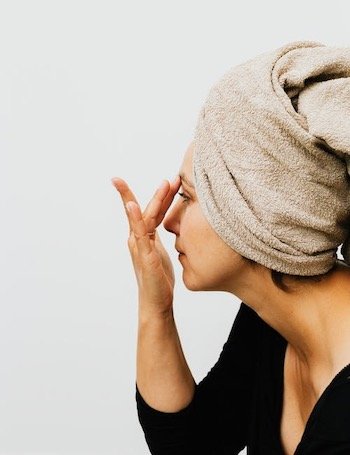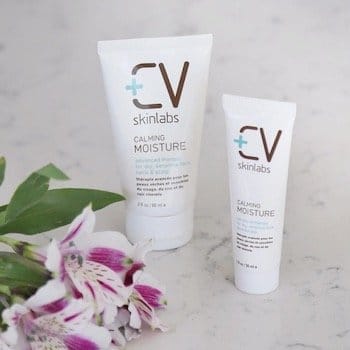
Are you experiencing signs of stressed skin?
You may be scratching your head. After all, you know if you feel stressed, but how are you supposed to tell if your skin is?
(Note: Our Body Repair Lotion helps heal stressed skin!)
Signs You Have Stressed Skin
Ask yourself if you’ve noticed any of the following lately:
- Acne flare-ups
- Hives or rash
- Redness and rosacea flare-ups
- Irritation
- Dry skin
- Dull skin
- Psoriasis and eczema flare-ups
- Saggy skin
If any of these have been occurring more frequently lately, you can probably assume that you have stressed skin. When your skin is out of balance and just not acting the way it usually does, that’s a good sign that it’s reacting to the stress you’re experiencing.
Remember that the skin is an organ just like your heart and lungs, so it’s affected by what goes on inside your body—including the changes that occur when you undergo stress.
 What is Stressed Skin?
What is Stressed Skin?
You know that stress can affect your body. You’ve noticed the headaches, stomach upset, and other issues that can come up when you’re going through a stressful time.
What you may find surprising is that stress can affect your skin too. Emotional stress and physical stress can, indeed, show up on your face.
Scientists have discovered an intricate relationship between psychological stress and the onset or aggravation of many skin diseases like eczema, rosacea, and psoriasis, as well as skin problems like acne and dryness.
When you’re under stress, your brain stimulates the release of stress hormones like cortisol, adrenaline, and norepinephrine. This is the “fight or flight” response you’ve probably heard about. These hormones, in turn, can negatively affect the skin, causing increased sweating, immune changes that can lead to inflammation, and reduced blood flow that can cause the skin to react with blemishes and rashes.
High cortisol levels—particularly those that persist for weeks or months—are also associated with impaired skin barrier function and premature aging.
The chemicals produced in the body when you’re stressed can also make your skin more sensitive and reactive over time so that you notice more redness, rashes, itching, and even fine lines and wrinkles.
Other Factors that Stress Your Skin
In addition to any psychological stress you may be experiencing, other factors can stress your skin out, making it react with redness and inflammation. These include:
- Medical treatments: Chemotherapy and radiation significantly affect skin cells, creating sensitivity, fragility, inflammation and irritation.
- Cosmetic treatments: Chemical peels, laser treatments, microdermabrasion, and other cosmetic treatments stress the skin and require it to regenerate and heal itself.
- Heavy use of at-home treatments: Excess exfoliation, retinol treatments, and even shaving can stress the skin, causing acne flare-ups, inflammation, and redness.
- Chemical irritants: The more stressed your skin is, the more it will react to certain chemicals in products such as synthetic fragrances, sulfates, chemical sunscreens, and preservatives.
- Environmental aggressors: Sun, wind, heat, cold air, pollution, and other environmental factors challenge the skin to protect itself and heal from environmental assaults.
10 Ways to Fix Stressed Skin
The best way to fix stressed skin, of course, is to get away from the stress. That’s not always possible, however, so while you’re working to make your life a little calmer, try these stress-relieving tips.
1. Find Ways to Shed the Stress of the Day
While you’re going through a stressful period, you must find a daily activity that you can do to shed the stress. If you have a healthy way to release it, your skin won’t suffer so much (and neither will the rest of you).
Here are some good stress-relieving options:
- Go for a walk—in a natural green area is best.
- Do yoga or tai chi 2-3 times a week.
- Engage in a hobby you enjoy like crafting, playing a musical instrument, or painting a picture.
- Spend time with a pet.
- Go out with your fun-loving friends.
- Listen to calming music.
- Workout—exercise is a proven stress-reliever.
- Take a hot bath with candles burning.
- Get a massage.
2. Practice Healthy Lifestyle Habits to Ease Stressed Skin
Stress often encourages us to engage in unhealthy habits like eating junk food and sitting on the couch all night. These activities, though, only make the effects of the stress much worse. If you maintain healthy habits while you’re going through a stressful period, your skin will be more resilient.
At a minimum, try to practice these habits daily:
- Get at least 7-8 hours of sleep per night.
- Exercise for at least 30 minutes, even if you have to break it up into 10-minute chunks.
- Practice deep breathing exercises throughout the day.
- Eat a well-balanced diet.
- Give yourself a break each day—take a bath, go for a walk, read a good book, etc.
3. Avoid Excess Sugar to Keep Skin Calm
Donuts. Brownies. Cookies. Cupcakes. Candy bars. They are all much harder to resist when you’re stressed out. You must find a way, as excess sugar makes stress much worse for your skin. It encourages inflammation, which can increase your risk of acne, redness, and irritation.
Try these tips to satisfy your sugar cravings without over-indulging:
- Eat a piece of fruit
- Munch on some nuts or seeds
- Break off a small piece of dark chocolate (at least 70 percent cocoa)
- Chew a piece of gum
- Enjoy a small mint
- Have a serving of low-sugar yogurt
- Grab a few dates or figs
- Eat a hard-boiled egg
- Go for a walk
4. Drink More Water When Your Skin is Stressed
It’s easy to get dehydrated when you’re stressed out. You’re not thinking about water, after all. Your mind is racing with everything that’s going on. You may also be drinking more alcohol instead, which dries out your skin.
Create an association in your mind that goes like this: Stress = Water. Every time you notice that you’re feeling stressed, drink a glass of water. In this way, you’ll train your brain to drink more when you’re stressed, rather than less, which will help your skin look better.
5. Drink Black Tea to Ease Skin Stress
Tea is full of healthy nutrients and antioxidants, so it’s always a good drink to enjoy, but when you’re stressed, it can help diminish the hormones that are likely to damage your skin.
In a study by the University College London, researchers found that participants who drank black tea were given a stressful task, their cortisol levels fell by 47 percent within an hour of completing it. Those who drank a fake tea substitute saw only a 27 percent stress decline.
6. Don’t Neglect Your Skincare Routine
So much is going on, you may be tempted to skip your regular skincare regimen. This is a horrible idea, as it will set you up for more skin problems. Instead, see your skincare time as “me time.” Use it to relax and take good care of yourself, and you’ll be happy you did.
 7. Use the Right Products to Help Skin Recover
7. Use the Right Products to Help Skin Recover
Products that are filled with chemicals, preservatives, synthetic fragrances, and sulfates add to the stress your skin is already experiencing. It’s best to use nourishing products all the time, but you need them even more when you’re feeling stressed out.
We recommend our CVSkinlabs product line because it gives you safe, nourishing formulas that will help counteract the effects of stress on your skin. Our products all contain our Tri-Rescue Complex, a unique blend of turmeric, alpha-bisabolol, and reishi mushroom that reduces inflammation and helps skin heal.
Our Body Repair Lotion is particularly good at relieving the all-over effects of stress. Ultra-soothing and fast-absorbing, it’s deeply hydrating and helps replenish and soothe dry, inflamed skin while immediately restoring radiance.
8. Give Your Skin Some Extra Love
In addition to maintaining your regular skincare routine, consider giving your skin some extra love whenever you’re going through a stressful time.
Try using a moisturizing mask at night if your skin is dry (our Calming Moisture doubles as a mask!), or choose a clay mask if your skin is extra oily. Give your skin a massage in the morning or at night before bed, or try a cooling gel made specifically for fighting the effects of stress.
9. Skip the New Products When Skin Is Stressed
Your skin is stressed out, which means it may be more reactive to certain ingredients in any new products that you try. Products that wouldn’t bother you at other times may cause redness, inflammation, and acne.
Instead, use products you know are safe because of their natural ingredients, or products you have used before that you know work well with your skin. Or try our CV Skinlabs products, as we made them specifically for skin that is struggling because of stress or other health issues.
10. Treat Stressed-Skin Breakouts Immediately
Stressed skin pretty much always means acne. Those frustrating breakouts are perhaps the biggest challenge many of us face when we’re stressed, and it’s always super challenging, as you certainly don’t need one more problem to deal with.
If you notice that acne starting to show up, don’t wait—address it immediately. Cleanse with a formula that contains salicylic acid. It’s gentle enough that it works for most skin types, and will help to cut down on acne-causing oil. Try over-the-counter products for emergency on-the-spot treatments, but remember it’s best to avoid acne products regularly because they can be drying and irritating.
The following natural products all can be used to treat a pimple in an emergency:
- Tea tree oil
- Rosemary or lemongrass oil (both have been found to inhibit the growth of the bacteria that cause acne)
- Green tea—steep a cup of green tea, allow it to cool, then apply to the pimple with a cotton ball or spray bottle
- Apple cider vinegar
Then don’t forget to moisturize. You may be tempted to allow acne-prone skin to “dry out,” but that would be a mistake. Acneic skin needs moisture too, as overdrying causes the skin to compensate by producing even more oil.
The key is to use moisturizers that help balance your natural skin oils and don’t clog your pores. Our Rescue + Relief Spray does just that: balances skin oils with an oil-free, non-comodegenic moisture, while calming acne inflammation.
How do you manage stressed skin?
Featured image by Anna Shvets from Pexels.
Sources
Chen, Y., & Lyga, J. (2014). Brain-skin connection: Stress, inflammation and skin aging. Inflammation & Allergy-Drug Targets, 13(3), 177-190. https://doi.org/10.2174/1871528113666140522104422
Steptoe, A., Gibson, E. L., Vuononvirta, R., Williams, E. D., Hamer, M., Rycroft, J. A., Erusalimsky, J. D., & Wardle, J. (2006). The effects of tea on psychophysiological stress responsivity and post-stress recovery: A randomised double-blind trial. Psychopharmacology, 190(1), 91-91. https://doi.org/10.1007/s00213-006-0620-z


